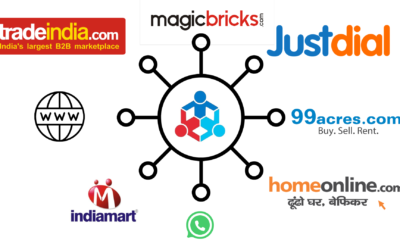To understand if you need a CRM, you don’t have to look at what kind of business you are in. Instead,
you should consider how you sell things and how you take care of your customers after they buy from you. It’s also important to think about how big your team is. A long time ago, only big companies used CRM systems because they were very expensive and hard to use. But now, with new technology, every business can use CRM systems. These systems have become simpler and easier to use, and they’re not as expensive as they used to be more people are using them now because they work well on mobile devices.
Do You Need A CRM?
Before there were computers, businesses used to manage their relationships with customers on paper or in their heads.They would remember their customers’ names, preferences, and needs, and try to provide good service to keep them coming back.
Nowadays, there are computer programs called CRM software that helps businesses keep track of their customers and provide better service. But just because there is a software program for it, it doesn’t mean every business needs it.
The type of business you have doesn’t decide whether you need a CRM or not. For example, a restaurant and a car dealership both have customers they need to keep track of, but they might have different ways of doing it.
Even the size of your business doesn’t decide whether you need a CRM or not. Some big companies don’t use a CRM system, while some small companies do. It all depends on your sales process and after-sales service.
So, whether you need a CRM or not depends on how you want to manage your customer relationships, and whether you think a CRM system will help you do it better.
Do You Need A CRM System For Your Business?
A CRM solution is a tool that can help businesses with three things:
- Sales
- Marketing
- Service
But before we talk about that, we need to think about how big your team is. If you have less than five people in your sales or service team,
A CRM system can be a valuable tool for managers, but it is important to implement it correctly so that it does not add unnecessary work.
When should you consider using a CRM for your sales processes? Here are some scenarios:
- If you need to follow up with prospects, a CRM can help you stay organized and track your progress.
- If you acquire new clients regularly, a CRM can help you manage your sales pipeline and close more deals. However, if you have a small number of repeat customers, you may not need a CRM.
- If you have walk-in customers, you may not need a CRM to manage sales. However, you may still need a CRM for marketing purposes. In B2C scenarios, CRM is often used to store customer data and create targeted marketing campaigns.
Some Exceptions To The Rules About When You Need A Crm System:
- Hotels typically don’t need a CRM because they have walk-in guests. However, a large hotel chain with a corporate sales team selling packages to corporate customers would need a CRM for that team.
- Hospitals and clinics typically don’t need a CRM because they have walk-in patients. However, larger hospitals and clinics with salespeople selling different packages to the general public and corporates may need a CRM.
These exceptions highlight the importance of considering your specific business needs when deciding whether or not to implement a CRM system. If you have a small business with a simple sales process, you may not need a CRM. However, if you have a large business with a complex sales process, you may find that a CRM system is essential.
It’s also important to consider the specific needs of your customers. If you have a large number of repeat customers, you may not need a CRM to track their sales history. However, if you have a small number of corporate customers, you may find that a CRM system is essential to manage your sales pipeline and close more deals.
Some Scenarios Where A Marketing CRM Can Be A Useful Tool For Marketing Teams
- Launching A New Product Or Service: A marketing CRM can help you track your leads and prospects from the moment they first express interest in your new product or service. This information can be used to prioritize your marketing efforts and ensure that you are targeting the right people with the right message.
- Running A Marketing Campaign: A marketing CRM can help you track the results of your marketing campaign, such as the number of leads generated, the number of sales closed, and the return on investment (ROI). This information can be used to optimize your marketing campaign and ensure that you are getting the most out of your marketing budget.
- Managing Customer Relationships: A marketing CRM can help you track your customer interactions and history. This information can be used to provide better customer service and upsell to your existing customers.
- Planning Your Marketing Strategy: A marketing CRM can help you gather data about your target audience, your competitors, and the market. This information can be used to develop a marketing strategy that is more likely to be successful.
- Segmenting Your Audience: A marketing CRM can help you segment your audience based on their interests, demographics, and past interactions with your business. This information can be used to create more targeted marketing campaigns that are more likely to be successful.
- Automating Your Marketing Tasks: A marketing CRM can help you automate many of your marketing tasks, such as sending out email campaigns, tracking website traffic, and managing social media accounts. This can free up your time so that you can focus on more strategic marketing initiatives.
- Measuring The Results Of Your Marketing Campaigns: A marketing CRM can help you measure the results of your marketing campaigns, such as the number of leads generated, the number of sales closed, and the return on investment (ROI). This information can be used to optimize your marketing campaigns and ensure that you are getting the most out of your marketing budget.
When should you consider using a CRM for customer service?
- If your product or service requires after-sales support, then a CRM can help you manage customer inquiries and complaints effectively.
- If you have service agreements or contracts with your customers, a CRM can help you keep track of service requests, monitor performance metrics, and ensure compliance with SLAs.
- If your customers are large enterprises that require strict internal and external SLAs, a CRM can provide the necessary tools to manage and measure service delivery.
Once you have determined the need for a CRM, the next question to consider is whether it is a good investment for your organization. CRM implementation involves the digital transformation of your sales, marketing, and service teams, and it is important to assess your organization’s readiness for change before deciding to invest in a CRM solution.
Buying A CRM Can Be A Difficult Decision.
Some companies with large turnovers and sales teams still don’t use CRM,while others have tried and failed to implement it successfully. Before making a decision, there is one important factor to consider – the appetite for change within your organization.
- Implementing CRM requires the digital transformation of your sales, marketing, and service teams.
- If your team is not ready for the change and you as a business leader cannot drive it, then it may not be worth investing in CRM without consulting an expert first.
- While CRM can help change the habits of your team, they need to be willing to change in the first place.





0 Comments